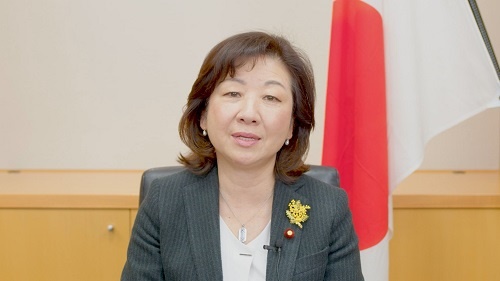皆さん、こんにちは。内閣府特命担当大臣、男女共同参画担当の野田聖子です。本日3月8日は、1975年に国連が定めた「国際女性の日」です。
新型コロナウイルス感染症の拡大は、世界中の人々、とりわけ女性の生活に大きな影響を及ぼしました。我が国では女性の就業者数が大幅に減少し、雇用や生活面で大変厳しい状況にあります。また、DVの相談件数も、女性の自殺者数も増加しました。
このように、新型コロナウイルス感染症の拡大は、我が国のジェンダー平等の著しい遅れを改めて浮き彫りにし、またその重要性が、改めて、強く意識されることとなりました。今ほど、ジェンダー平等の達成が求められる時代はありません。
ジェンダー平等は、日本国政府の重要かつ確固たる方針です。世界経済フォーラムのジェンダー・ギャップ指数において、我が国は156か国中120位と先進国最下位、特に政治分野と経済分野における値が低くなっています。また、世論調査において、日本の社会全体として、男女の地位は平等かという問いに対して、「平等」と答えた人の割合は21%に過ぎません。諸外国もジェンダー平等に向かって走り続けている中、我が国も異次元のスピードで取組を進めていく必要があります。この数十年間で、女性を取り巻く環境は急速に変わりました。人生100年時代を迎え、日本の女性の半分以上は90歳まで生きます。離婚件数は結婚件数の3分の1となりました。男性が働き、女性が家を守るというかつての家族像はもはや標準でなく、女性の人生と家族の姿が多様化しています。そうした社会の変容も念頭におきながら、迅速に対応する必要があります。政治、経済、社会などのあらゆる分野において女性と男性が共に意思決定過程に参画をすること、また、多様性を受け入れる社会を作り、多くの国民が「この社会は平等だ」と感じられるような、社会の変革が必要です。
こうした観点を踏まえて、「第5次男女共同参画基本計画」を着実に実行するため、「女性版骨太の方針」の取りまとめに向けて、4つの柱で具体策を検討しているところです。1つ目は「女性の経済的な自立」です。男女間の賃金格差の是正に向けた企業の開示ルールを見直します。2つ目は「女性が尊厳と誇りを持って生きられる社会の実現」です。女性に対する暴力の根絶は急務であり、配偶者暴力への対策を抜本的に強化します。また、フェムテックの推進により女性の健康にも取り組みます。3つ目は、「男性の家庭・地域社会における活躍」です。男性が家庭や地域社会において望まぬ孤立に陥らないよう活躍の場を広げ、社会的なつながりを持てるようにすることが、女性の今ある負荷を減少させるために重要です。4つ目は、「女性の登用目標達成」です。2020年末に決定した第5次男女共同参画基本計画に掲げられた女性の登用・採用に関する目標の着実な達成です。これらの実現に、日本政府を挙げて力を尽くしてまいります。
最後になりますが、この未曽有の困難の中にあってもジェンダー平等のために力を尽くしていただいている皆様方に心からの敬意と感謝を表したいと思います。新型コロナウイルス感染症拡大の影響下で、困難に直面している女性を誰一人取り残さない、その強い思いを持って、「国際女性の日」に当たり、男女共同参画担当の内閣府特命担当大臣として、ジェンダー平等の達成に向け、政府を挙げて取り組んでまいりますことを改めてお誓いいたします。
令和4年3月8日
女性活躍担当大臣・内閣府特命担当大臣(男女共同参画)
野田 聖子
Minister’s Message on International Women’s Day 2022
Hello, everyone. My name is NODA Seiko, and I am the Minister of State for Gender Equality. Today, March 8, was established as International Women’s Day by the United Nations in 1975.
The pandemic of COVID-19 has had a significant impact on the lives of people, especially women, all around the world. In Japan, the number of women employed has declined greatly, and women find themselves placed in extremely difficult situations in terms of employment and living conditions. The number of domestic violence consultations has also increased, as has the number of women who committed suicide.
In this way, the pandemic of COVID-19 highlighted once again how Japan lags far behind on gender equality. It also made us strongly aware of its importance. There has never been a time when achieving gender equality is sought after as much as today.
Gender equality is the important and solid policy for the Government of Japan. In the latest Gender Gap Index published by the World Economic Forum, Japan is ranked 120th out of 156 countries, which is the lowest among developed countries, especially with low scores in the political and economic fields. In addition, a public opinion poll shows that only 21% of respondents answered “equal” to the question whether men and women are equal in Japanese society as a whole. As other nations continue running toward gender equality, Japan must also advance its efforts at an unprecedented speed. Over the past few decades, the environment surrounding women has rapidly changed. As Japan approaches the era of the 100-year life, half of Japanese women live to be 90 years old.The number of divorces has reached one-third the number of marriages. The traditional family image where the man works and the woman takes care of the home is already no longer the norm, and women’s lives and the structure of families have diversified. A rapid response is necessary, while keeping in mind such changes in society. We must create a society where both women and men participate in the decision-making process in all fields including politics, economics, and society, and where diversity is embraced and many people feel that this society is equal.
In order to steadily implement the Fifth Basic Plan for Gender Equality with these perspectives, Japan is examining concrete policies based on four pillars to compile the Basic Policies Related to Women. . The first pillar is “women’s empowerment.” This requires revision of the corporate disclosure rules to fix the gender pay gap. The second is “the realization of a society in which women live with dignity and pride.” Eliminating violence against women is an urgent task, and Japan is fundamentally strengthening the measures to respond to spousal violence. Japan is also addressing women’s health by promoting femtech. The third pillar is “men’s engagement in families and communities.” Expanding the areas for men’s participation in families and communities so that men do not fall into unwanted isolation and have social connections is important for reducing the present burden of women. The fourth is “achieving the goals for the appointment of women.” This means the steady achievement of the goals related to appointment and employment of women, which was set forth in the Fifth Basic Plan for Gender Equality decided at the end of 2020. The whole Government of Japan will do its utmost toward realizing these goals.
In closing, I would like to express my heartfelt respect and gratitude to all of you who are making every effort for gender equality even amid these unprecedented difficulties. With the steadfast determination to leave behind no woman facing difficulties due to the impact of the pandemic of COVID-19, as the Minister of State for Gender Equality, I again pledge on this International Women’s Day that the entire Government of Japan will work toward achieving gender equality.
March 8, 2022
Minister in Charge of Women’s Empowerment; Minister of State for Gender Equality
NODA Seiko
